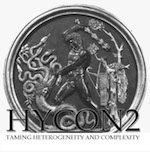Control of Constrained Hybrid Systems
This research project is not currently active and this page is not regularly updated. It is provided here for archival purposes.
Hybrid models describe systems composed of both continuous and discrete components. The former are typically associated with physical first principles, the latter with logic devices, such as switches, digital circuitry, software code. A typical instance are real-time systems, where physical processes are controlled by embedded controllers. Our research focuses, among other topics, on the synthesis of optimal controllers for hybrid systems, the formal verification for safety and stability analysis, and the development of efficient software tools for modeling and control of hybrid systems.
We introduced a new framework for modeling of hybrid systems described by interdependent physical laws, logic rules, and operating constraints, denoted as Mixed Logical Dynamical (MLD) systems. These are hybrid systems described by linear discrete-time dynamic equations subject to linear inequalities involving real and integer variables. We developed the declarative language HYSDEL (HYbrid System DEscription Language) which fully automatizes the construction of MLD and Piecewise Affine (PWA) forms from a high level description of the hybrid system.
For hybrid systems we study constrained optimal controllers which are able to stabilize hybrid systems on desired reference trajectories while obeying operating constraints, and possibly take into account previous qualitative knowledge. The potential of the method was demonstrated on a number of industrial applications.
We have shown how optimal controllers can be expressed explicitly as piecewise affine control laws by solving multiparametric programs. In this form the controllers are suitable for implementation on fast hybrid processes.
Almost all algorithms developed by our group are available in the external page Multi-Parametric Toolbox.
Modeling
We have produced a number of results on modeling of discrete-time hybrid dynamical systems. Depending on the intended application, a different approach might provide better tools:
- Mixed logical dynamical system framework: uses continuous and binary auxiliary variables and constraints to encode physical laws and switching rules in a straightforward manner
- Piecewise affine (PWA) system framework: the most natural extension of linear systems that defines a number of affine state transition functions over a partition of the statespace
- Inverse optimization framework: interprets dynamical systems as optimizing processes and can be systematically derived (amongst others) from a PWA description
- Mode enumeration: an efficient approach to enumerating all possible operating modes of discrete hybrid automata
- Identification of PWA systems: using these results it is possible to systematically identify a PWA model from real-world data
Control Synthesis
Most hybrid system models, including those described on our webpage on modeling of hybrid systems, require or enable specialized approaches to controller synthesis. We have put effort into this along different lines:
- Model predictive control (MPC): we have produced a significant number of fundamental results on MPC of both linear and hybrid systems
- Online and explicit MPC: optimization based control methods such as MPC might be applicable to dynamical systems with fast sampling times by trading off the distinct advantages of online and offline (explicit) computations
- Constrained Finite Time Optimal Control (CFTOC)
- Constrained Infinite Time Optimal Control (CITOC)
- Robust control: in the presence of disturbances and measurement noise, special care must be taken to maintain stability of the dynamical system
Analysis
For many hybrid system models we provide results and tools for analysis of different system properties such as stability, reachability, and verification of specifications:
- Lyapunov stability: specifically for PWA systems a number of tools exist for stability analysis using Lyapunov functions
- Reachability analysis & verification: the typical approach to certify that a system satisfies desired safety properties
- Observability & controllability: for PWA systems, optimization based tests have been proposed
Computational Issues
To facilitate the application of the developed theory to real systems, we investigate how algorithms and tests can efficiently be implemented on modern hardware:
- Complexity reduction: for most control tasks it is beneficial to have as simple a description of the system as possible
- Computational geometry: because many hybrid system descriptions rely on efficient polytope manipulations we develop on provide some dedicated tools
- Lagrangian decomposition: for interconnections of large numbers of hybrid systems, dual decomposition approaches can be applied to solve the MPC optimization problems
Estimation
The problem of estimating the system state from measurable outputs of a hybrid system is not as well-understood as the analogous problem for linear systems. We present some techniques that rely on the estimation problem being dual to the control problem and therefore allows for similar techniques:
- Moving horizon estimation: the receding horizon principle of MPC can also be applied to estimate the state of PWA and MLD systems
- Fault detection: similar to (but distinct from) the estimation problem, fault detection aims to identify significant changes in the plants behavior from input-output-data
Applications
Hybrid systems are quite ubiquitous in physical applications. In most cases the challenge is in obtaining a good model the plant as well as implementing modern control algorithms on available hardware. We present here a number of applications where the developed theory leads to superior process operation:
- Automotive: common control tasks in cars such as traction control, cruise control, and the control of an electronic throttle can benefit from applying hybrid system theory
- Active damping: many damping applications contain switching components which can be modeled using one of the hybrid system frameworks presented above
- Hydropower: for optimal hydropower plant operation it is beneficial to take into account both knowledge of future and about discrete dynamics of the system which makes MPC a good tool to use in this case


